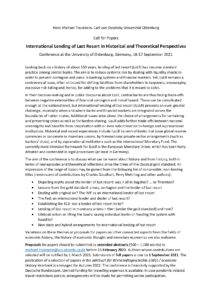Hans-Michael Trautwein, Carl von Ossietzky Universität Oldenburg
International Lending of Last Resort in Historical and Theoretical Perspectives
Conference at the University of Oldenburg, Germany, 16-17 September 2021
Looking back on a history of about 150 years, lending of last resort (LoLR) has become standard practice among central banks. The aim is to reduce systemic risk by dealing with liquidity shocks in order to prevent contagion and panic in banking systems and financial markets. Yet, LoLR remains a controversial issue, often criticized for shifting liabilities from shareholders to taxpayers, encouraging excessive risk-taking and, hence, for adding to the problems that it is meant to solve.
 In their decision-making and in public discourse about LoLR, central banks are thus facing trade-offs between negative externalities of financial contagion and moral hazard. These can be complicated enough at the national level, but international lending of last resort (ILoLR) presents an even greater challenge, especially when and where banks and financial markets are integrated across the boundaries of nation states. Additional issues arise about the choice of arrangements for containing and preventing crises as well as for burden-sharing. ILoLR adds further trade-offs between national sovereignty and benefits from cooperation with or even subordination to foreign and supranational institutions. Historical and recent experiences include ILoLR by central banks that issue global reserve currencies or cooperate in monetary unions, by transnational private-sector arrangements (such as bankers’ clubs), and by supranational institutions such as the International Monetary Fund. The currently most intensive framework for ILoLR is the European Monetary Union, which has been hotly debated and contended in legal procedures (at least in Germany).
In their decision-making and in public discourse about LoLR, central banks are thus facing trade-offs between negative externalities of financial contagion and moral hazard. These can be complicated enough at the national level, but international lending of last resort (ILoLR) presents an even greater challenge, especially when and where banks and financial markets are integrated across the boundaries of nation states. Additional issues arise about the choice of arrangements for containing and preventing crises as well as for burden-sharing. ILoLR adds further trade-offs between national sovereignty and benefits from cooperation with or even subordination to foreign and supranational institutions. Historical and recent experiences include ILoLR by central banks that issue global reserve currencies or cooperate in monetary unions, by transnational private-sector arrangements (such as bankers’ clubs), and by supranational institutions such as the International Monetary Fund. The currently most intensive framework for ILoLR is the European Monetary Union, which has been hotly debated and contended in legal procedures (at least in Germany).
The aim of the conference is to discuss what can be learnt about history and from history, both in terms of real episodes and theoretical reflections since the times of the classical gold standard. An impression of the range of topics may be gained from the following list of conceivable, non-binding titles (reminiscent of contributions by Charles Goodhart, Perry Mehrling and other authors):
- Dispelling myths about the lender of last resort: was it all in Bagehot? … or Thornton?
- Lessons from the gold standard: crises, contagion and the lender of last resort
- Dealing with original sin? The IMF as an international lender of last resort
- The Fed: an international lender and dealer of last resort?
- Establishing the ECB: not a lender of last resort to be?
- Lending of last resort in monetary unions – then (under the gold standard) and now?
- Lifeboat action or lifting the boats: saving individual banks or flooding the system with liquidity?
- Non-state and hybrid arrangements for international lending of last resort
Variations on these themes or proposals for papers on other connected aspects from the fields of economic history, the history of economic thought and monetary economics are also welcome.
Proposals for papers should be submitted as extended abstracts (500 – 1.000 words) to michael.trautwein@uni-oldenburg.de before 15 February 2021. Authors whose contributions are selected will be notified by 1 March 2021. Submission of full papers is due by 1 September 2021. The publication of a selection of papers in the Jahrbuch für Wirtschaftsgeschichte (JWG) / Economic History Yearbook is envisaged for Autumn 2022. The conference is financially supported by the Deutsche Bundesbank. Limited funding for travelling expenses is available. In case pandemic-related travel restrictions persist, arrangements will be made for permitting online participation.

